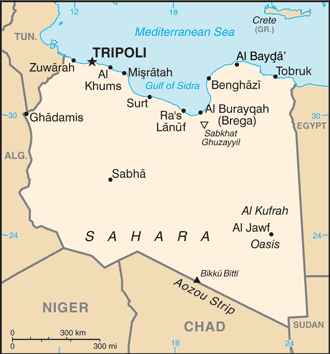
Washington, DC–(ENEWSPF)–June 9, 2016. The Department of State warns U.S. citizens against all travel to Libya and recommends that U.S. citizens currently in Libya depart immediately. The security situation in Libya remains unpredictable and unstable, and extremist groups continue to plan terrorist attacks against U.S. interests. If in Libya, make contingency emergency plans and maintain security awareness at all times. This supersedes the Travel Warning issued on September 16, 2015.
On July 26, 2014 the U.S. Embassy suspended operations in Libya. The Department of State has extremely limited capacity to assist U.S. citizens in Libya.
Government authorities lack control over much of the country, and local police and security services may have limited to no capacity to respond to emergencies or requests for assistance. Crime levels remain high, including the threat of kidnapping, and various groups have called for attacks against U.S. citizens and U.S. interests in Libya. Hotels frequented by westerners have been attacked by armed groups and terrorists. Violent extremist activity in Libya remains high. Foreigners may be targeted by violent extremist groups seeking to injure, kidnap or kill anyone associated with the United States.
Most international airports are closed, and flights out of operational airports are sporadic and may be cancelled without warning. Military-grade weapons remain in the hands of private individuals, U.S. and UN-designated terrorists, and other armed groups in Libya. These include antiaircraft weapons that may be used against civilian aviation. The U.S. government prohibits U.S. commercial aviation operations within Libyan airspace. Due to risks to civil aviation operating within or in the vicinity of Libya, the Federal Aviation Administration (FAA) has issued a Notice to Airmen (NOTAM) and/or a Special Federal Aviation Regulation (SFAR). For further background information regarding FAA flight advisories and prohibitions for U.S. civil aviation, U.S. citizens should consult Federal Aviation Administration’s Prohibitions, Restrictions and Notices
Seaports and roads can close with little or no warning. U.S. mariners are advised to exercise extreme caution while transiting in or near Libyan territorial waters. The Libyan National Army announced on January 7, 2015 that all vessels in Libyan waters require army approval for transit, following the January 4, 2015 bombing of a Greek-operated oil tanker that killed two crewmen near Derna, Libya. Vessels are advised to proceed with extreme caution when approaching all Libyan oil terminals and ports, and are encouraged to adhere to the recommendations in the U.S. Coast Guard’s Port Security Advisory 1-14 issued April 1, 2014. Mariners planning travel to Libya should check the U.S. Coast Guard Homeport website for any Port Security Advisory Updates and the NGA Broadcast Warnings Website (select “Broadcast Warnings”) for any special warnings or Maritime Administration Advisories before arrival.
Various militias have supplanted the police in maintaining internal security. Militia members operate checkpoints within and between major cities. Militia groups sometimes detain travelers for arbitrary or unclear reasons, without access to a lawyer or legal process, and without allowing detainees to inform others of their status. You should carry proof of citizenship and valid immigration status at all times, though these documents do not guarantee fair treatment. Militias in control of Libya’s airports have arbitrarily detained and held U.S. citizen travelers for weeks at a time before being released. The State Department has extremely limited capacity to assist U.S. citizens who are detained by militia groups.
If travel in desert and border regions of Libya is critically necessary, exercise caution and comply with local regulations. Militia groups control many border crossings, and recent terrorist attacks have occurred in the border region, where extremists have kidnapped Westerners. Please note the travel warnings and alerts for neighboring countries, Algeria, Tunisia, Chad, Niger, and Sudan.
For more information:
- See the State Department’s travel website for the Worldwide Caution, Travel Warnings, Travel Alerts, and Specific Information for Libya.
- Enroll in the Smart Traveler Enrollment Program (STEP) to receive security messages and make it easier to locate you in an emergency.
- As cell phone service is unreliable in Libya, emergency calls may also be placed through the Department of State at 1-888-407-4747 toll-free in the United States and Canada or 1-202-501-4444 from other countries.
- Follow us on Twitter and Facebook.
Source: http://www.state.gov








